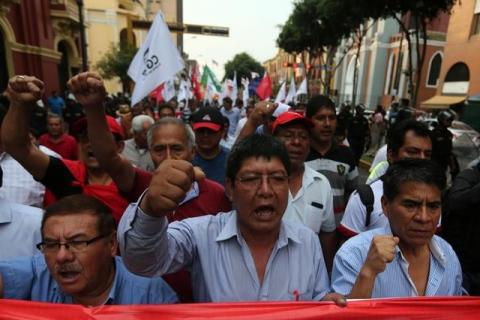Advertisement
Crooked business as usual in Angola, activists say, after Brazil firm admits bribes
NAIROBI/SAO PAULO (Reuters) - Angola's authorities have ignored the admission by a Brazilian firm that it paid $50 million in bribes to secure contracts in the country, activists say, despite demands from watchdogs that it join international investigations into the corruption.
Brazilian engineering conglomerate Odebrecht admitted to the illegal payments in Angola as one part of a guilty plea in December in New York court, in which it confessed to paying $788 million in bribes, mostly across Latin America.
The company has been at the centre of vast corruption investigations in its home country and eight other Latin American states where it has admitted making the illegal payments. CEO Marcelo Odebrecht was jailed for 19 years in 2016 for paying bribes.
But in Angola, which along with Mozambique is the only country outside of Latin America on the list of places where it has admitted paying bribes, "there has been absolute silence," said anti-corruption campaigner Rafael Marques de Morais.
Marques de Morais demanded an investigation in Angola in January after the U.S. court published the plea deal detailing the company's admissions, but said he was not surprised to receive no response from the authorities.
"The point is that there is no official interest in fighting corruption. Or even pretending that there is an interest in fighting corruption. The Angolan judicial system wants this to go away because of the involvement of senior officials."
Over the past two decades Angola has experienced some of the fastest economic growth in the world thanks to an offshore oil boom. But most of its 21.5 million people remain in abject poverty, while a small elite have prospered.
Odebrecht grew to become Angola's largest private-sector employer as it won contracts for projects ranging from construction and agro-processing to mining, including the 2,000 MW Lauca hydroelectric project on the Kwanza river.
In Angola, it employs 7,300 people directly and a further 3,500 sub-contractors. The company said the bribery case had no impact on its operations in Angola.
"Odebrecht continues operating normally in the country," a spokesman in Brazil said.
Angola has no government spokesman. Attempts to obtain comment from the office of President Jose Eduardo dos Santos were unsuccessful. When asked to for comment, Norberto Garcia, head of the UTIP government agency that handles major private investments in the country, said he didn't know anything about the issue. "I barely heard references about it somewhere," he told Reuters.
"BENEFITS" Global anti-corruption watchdog Transparency International describes Angola as one of the most corrupt states on earth, ranked 164th out of 176 countries on its index of perceived corruption.
The watchdog has called upon the 11 countries where Odebrecht admitted paying bribes -- nine in Latin America plus Angola and Mozambique -- to work together to establish a joint investigation into the company's confessed crimes.
In one example cited in the plea agreement filed with a court in the Eastern District of New York, someone identified only as "Odebrecht Employee 6" was responsible for the company paying one Angolan official $8 million to secure an infrastructure project.
The Angolan official was not named. In another example, a top official in an Angolan state-owned and state-controlled firm received $1.19 million from Odebrecht to push business the company's way. In return, Odebrecht secured some $261.7 million in "benefits" from the payments, the document said.
The plea agreement also detailed bribery in Mozambique, another former Portuguese colony in southern Africa, but the amounts described were far smaller: $900,000 in corrupt payments made by Odebrecht officials between 2011 and 2014.
As in Angola, the case is little discussed in Mozambique. Government officials there declined to comment.
Paula Cristina Roque, an Oxford University-based Angola analyst, said Odebrecht projects in Angola were often secured without having to go through a public tender process.
"Many Angolans believe the company enjoyed close ties to President dos Santos," she said.
Odebrecht is seeking plea agreements with various Latin American governments aggressively investigating its activities after details of the plea agreement were made public in December.
Brazil's former president Luiz Inacio Lula da Silva is facing five separate trials related to the investigations. One accuses him of corruption charges related to Odebrecht winning Angola contracts and receiving low-interest loans from Brazil's state development bank to finance the work.
Angola's leader Dos Santos, a Soviet-trained oil engineer, has been in charge since 1979 but is not running in a presidential election this year.
However, his family is expected to maintain considerable influence over politics and the economy. His daughter Isabel was appointed chairwoman of the state oil firm last year, while his son Jose Filomeno runs Angola's sovereign wealth fund.
(Additional reporting by Joe Brock in Johannesburg, Herculano Coroado in Luanda, Manuel Mucari in Maputo and Tatiana Bautzer in Sao Paulo; Editing by Ed Cropley and Peter Graff)



















Add new comment